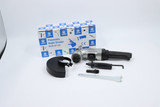Advanced Battery Technology Powering Maryland's Industrial Revolution
Key Takeaways
- Lithium-ion batteries are leading the charge in industrial applications.
- Increased energy density and longer lifespan offer significant advantages.
- Integration with smart management systems enhances performance and longevity.
Introduction
Maryland's industrial sector is undergoing a transformation driven by cutting-edge battery technology. This shift towards cleaner, more efficient energy solutions is not only boosting productivity but also promoting environmental sustainability. Advanced battery technology is driving innovation across key sectors such as manufacturing, transportation, and renewable energy.
With the development of high-capacity, longer-lasting batteries, industries in Maryland are shifting toward more efficient and sustainable operations. Lithium-ion and solid-state batteries, in particular, are enabling businesses to adopt cleaner energy solutions, from electric vehicles to grid energy storage.
This technological leap not only reduces reliance on fossil fuels but also enhances productivity by powering equipment and machinery for longer periods with faster recharge times. As Maryland continues to invest in its industrial growth, the integration of advanced battery technology is transforming production capabilities, reducing operational costs, and supporting a greener, more sustainable future for the state's economy.
This comprehensive guide explores the rise of advanced batteries and their impact on Maryland's diverse industrial landscape.
A Green Future for Maryland Industries
Maryland's commitment to clean energy and innovation has paved the way for widespread adoption of advanced battery systems across various industrial settings. These batteries are not just powering equipment; they're fundamentally changing how industries operate. Let's delve into the world of advanced battery technology and how it's shaping the future of Maryland's industrial landscape.
From Lead-Acid to Lithium-Ion: A Power Shift
For decades, lead-acid batteries dominated industrial applications. However, their limitations became apparent as industries demanded more power, longer runtimes, and reduced maintenance. Enter lithium-ion batteries: a game-changer addressing these challenges.
Lithium-ion Battery Advantages:
1. Higher energy density
2. Longer cycle life
3. Faster charging times
4. Reduced weight
5. Lower maintenance requirements
Impact on Maryland's Industries:
1. Increased operational efficiency
2. Reduced energy costs
3. Improved workplace safety
4. Enhanced environmental sustainability
The demand for advanced battery solutions continues to grow as more industries recognize these benefits, fueling further innovation and development.
Industrial Applications of Advanced Batteries
Manufacturing and Warehousing:
1. Electric Forklifts: Longer runtimes, faster charging, and zero emissions for cleaner indoor operations.
2. AGVs (Automated Guided Vehicles): Extended operation without frequent recharging for streamlined warehouse processes.
3. Order Picking Equipment: Increased efficiency with extended battery runtime and quick charging.
4. Portable Power Tools: Improved mobility and productivity on factory floors with cordless tools.
Renewable Energy Integration:
1. Grid-Scale Energy Storage: Balances the intermittent nature of renewable sources like solar and wind.
2. Microgrids: Creates resilient, self-sufficient power systems for critical infrastructure.
3. EV Charging Infrastructure: High-capacity batteries help manage grid load from electric vehicle charging stations.
Construction and Heavy Equipment:
1. Electric Excavators and Loaders: Reduced emissions and operating costs on job sites.
2. Portable Power Stations: Clean, quiet power for tools and equipment in remote locations.
3. Lighting Towers: Efficient, low-maintenance LED lighting powered by advanced batteries for nighttime construction.
Advancements in Battery Management Systems (BMS):
Sophisticated BMS significantly enhance performance and longevity:
1. Real-Time Monitoring: Tracks battery parameters for optimal performance and early detection of potential issues.
2. Predictive Maintenance: Analyzes data to predict and prevent problems, minimizing downtime.
3. Performance Optimization: Adjusts charging and discharging patterns for maximum efficiency and lifespan.
4. Data Analytics: Helps businesses optimize energy usage and battery management strategies.
5. Safety Features: Includes safeguards against overcharging, overheating, and other hazards.
A Sustainable and Thriving Industrial Future
The adoption of advanced battery technology has a significant economic and environmental impact:
Economic Benefits:
1. Reduced Operating Costs
2. Increased Productivity
3. Energy Cost Savings
4. New Job Opportunities
Environmental Benefits:
1. Reduced Carbon Emissions
2. Improved Air Quality
3. Sustainable Resource Use
4. Noise Pollution Reduction
Case Studies of Maryland Businesses Benefiting from Advanced Batteries:
Led by Professor Chunsheng Wang and Assistant Professor Paul Albertus, the team aims to create high-energy, rechargeable batteries that can power large vehicles while minimizing infrastructure disruption. This innovative technology could significantly reduce greenhouse gas emissions and revolutionize modern transportation. The researchers are collaborating with WH-Power, Saft America, and other institutions on the PROPEL-1K project, which seeks to quadruple energy storage capabilities beyond current electric vehicle batteries
Future Trends in Industrial Battery Technology:
1. Solid-State Batteries: Promise even higher energy density, faster charging, and improved safety.
2. Sodium-Ion Batteries: Potential alternative offering lower costs and sustainable production.
3. AI in Battery Management: More accurate predictions and optimizations for enhanced performance.
4. Recycling and Second-Life Applications: Creates new opportunities for sustainability.
Challenges and Considerations:
1. Initial Investment Costs
2. Infrastructure Requirements
3. Training and Education for Staff
4. Supply Chain Considerations
5. Regulatory Compliance
Future Outlook for Battery Technology in Maryland:.
Maryland Battery plant tries to upend rivals-and Lithium-ion:
The article discusses Ion Storage Systems, a company building a new solid-state battery plant in Maryland. The company plans to produce batteries for the Pentagon, electric vehicles, phones, and grid storage. Solid-state batteries offer advantages over traditional lithium-ion batteries by enabling faster charging and storing more power.
Frequently Asked Questions
1. What types of advanced battery technology are leading Maryland’s industrial revolution?
Lithium-ion and solid-state batteries are at the forefront, offering high energy density, longer lifespan, and faster charging capabilities, which are essential for industries like manufacturing, transportation, and renewable energy storage.
2. How is advanced battery technology benefiting Maryland’s manufacturing sector?
It allows manufacturers to reduce energy costs, power machinery for longer periods without interruptions, and increase productivity by minimizing downtime due to quick recharge cycles, thus streamlining operations.
3. What role do batteries play in Maryland’s shift toward renewable energy?
Advanced batteries provide efficient energy storage solutions for solar and wind power, enabling Maryland to store excess energy and use it when needed, promoting a more reliable and sustainable energy grid.
4. How does battery technology impact the transportation sector in Maryland?
The development of more powerful and durable batteries is facilitating the adoption of electric vehicles (EVs) in Maryland, reducing carbon emissions, and promoting eco-friendly transportation alternatives.
5. What are the environmental benefits of advanced battery technology in Maryland?
Advanced battery technology supports the transition to clean energy, reduces reliance on fossil fuels, and minimizes industrial carbon footprints by enabling the use of electric-powered machinery and vehicles, contributing to a more sustainable future.
Related Articles
The Science Behind LiFePO4: Why Dakota Lithium Leads the Market
Powering the Future: Unveiling Lithium Battery Technology for Cars and Beyond
Advanced Battery Technology for Industrial Applications in Maryland
Advanced battery technology is revolutionizing Maryland's industrial landscape, offering unprecedented levels of efficiency, sustainability, and performance. From manufacturing floors to renewable energy systems, these innovative power solutions are driving the state's industries towards a cleaner, more productive future.
As the technology continues to evolve, Maryland businesses that embrace these advancements will be well-positioned to lead in their respective sectors, benefiting from reduced costs, improved operations, and a smaller environmental footprint.
Ready to upgrade your industrial battery systems and boost your Maryland business's efficiency? Contact Tend Industrial Supplies at sales@tendsupplies.com or visit our website at tendsupplies.com to explore our range of advanced battery solutions and expert advice tailored to your specific needs.









